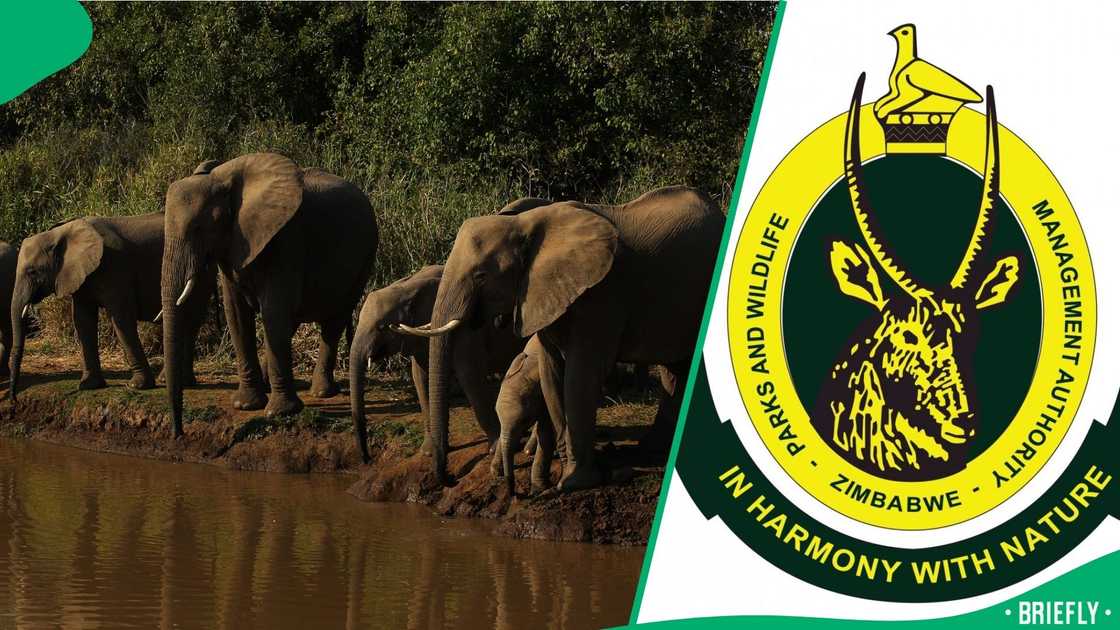Zimbabwe to Begin Culling Elephants, Social Media in Disbelief As Meat to Given to Local Communities
- Zimbabwe Parks and Wildlife Authority (ZimParks) has announced it would be culling elephants to reduce the population
- ZimParks stated that the elephant meat would be distributed to local communities, while the ivory would be state property
- Social media users shared hilarious reactions to the news, with many suggesting the country sell the animals instead
Don't miss out! Join Briefly News Sports channel on WhatsApp now!

Source: Getty Images
Briefly News journalist Byron Pillay has dedicated a decade to reporting on the South African political landscape, crime, and social issues. He spent 10 years working for the Northern Natal Courier before transitioning to online journalism.
ZIMBABWE – A decision by Zimbabwe Parks and Wildlife Authority (ZimParks) to cull elephants in the country is causing quite a stir online.
ZimParks announced that it would cull dozens of elephants due to a rapid increase in the animal’s population in the country. Zimbabwe has the second-biggest elephant population in the world after Botswana.
ZimParks announces plans to cull elephants

Read also
“What a messy breakup”: SA entertained by Elon Musk and Trump’s juicy scandals after major fallout
In an official statement on Tuesday, 3 June 2025, ZimParks announced that it would start at a private game reserve in the southeast, where 50 elephants would be initially targeted.
PAY ATTENTION: stay informed and follow us on Google News!
While the wildlife authority plans to start with 50, it did not confirm how many elephants would be killed in total, or over what period.
"Elephant meat from the management exercise will be distributed to local communities, while ivory will be state property that will be handed over to ZimParks for safekeeping," its statement read.
Elephant population balloons at Save Valley Conservancy
ZimParks explained that the decision was made due to the rising number of elephants. The wildlife authority noted that an aerial survey in 2024 showed that the Save Valley Conservancy had 2,550 elephants. This was more than triple its carrying capacity, which is 800.
At least 200 have been moved to other parks over the past five years, but this has done little to solve the problem. 200 elephants were also culled in 2024, the country’s first major cull since 1988.
You can view the statement below.

Read also
“You people are rich, rich”: Man shows off R107k restaurant bill that left South Africans buzzing
Social media users amused by ZimParks’ decision
The decision to cull the animals and give the food to community members has sparked hilarious reactions online as many joked about the situation in the country.
Cassie Serithi exclaimed:
“😮 Oh my God. What the hell, man? 😳 Animals are taking over Zimbabwe, and Zimbabweans are taking over South Africa 🤣"
Gareth Smith asked:
“Don't they have any farmers left?”
Kudzaishe Cassie Muteti said:
“I didn't know elephant meat could be eaten. I'm coming home, coming home, tell the world that I'm coming home.”
Phumzile Kamogelo Shaddy Themba added:
“Zimbabwe i dom neh. Can't they just sell them and use the money to fix some of the problems they are experiencing? Rather than eating them and going to the toilet afterwards. Yoh. My Africa, bathong.”
Norman C Maphosa Marowa suggested:
“They must sell some of the elephants to Donald Trump, then use the money to fix roads or something.”

Read also
Julius Malema weighs in on fuel levy hike, EFF leader concerned about effect on struggling families
Thato Ramatiisa joked:
“That meat will find itself here in South Africa and be sold as 'affordable beef'. Look out on Facebook market.”
Tshingana Sandiso Prehessure stated:
“Zimbabweans, go home. Your government is going to provide you with fresh meat.”
Proff AB asked:
“Quick one. Who eats elephant meat except the Chinese? They eat anything that moves.”
Lesedi Molopyane questioned:
“Can't they relocate the animals, or auction them off or sell them?”
What you need to know about Zimbabwe
Zimbabwe, formerly known as Rhodesia, is a landlocked country in southern Africa, sharing borders with South Africa, Botswana, Zambia, and Mozambique. Its most widely spoken languages include English, Shona, and Ndebele. As of 2024, Zimbabwe’s population is estimated at 16.6 million, up from 13.3 million in 2013, placing it 68th globally.
In the late 1990s, land ownership became a major issue. Despite reforms, white Zimbabweans, less than 1% of the population, owned around 70% land. In 2000, then-President Robert Mugabe launched a controversial compulsory land redistribution program. Courts repeatedly challenged the legality of the process, but the government ignored the rulings. The program, combined with prolonged drought and lack of financial support, devastated the agricultural sector, once a leading source of exports.
The crisis triggered hyperinflation and severe shortages of basic goods due to a collapse in currency value. In 2003, Zimbabwe withdrew from the Commonwealth of Nations after being suspended for human rights violations.
PAY ATTENTION: Follow Briefly News on Twitter and never miss the hottest topics! Find us at @brieflyza!
Source: Briefly News


